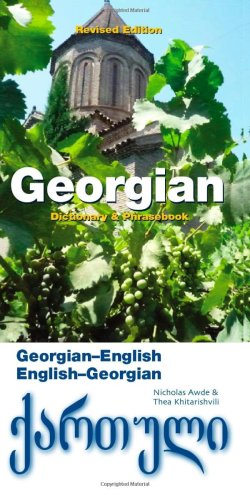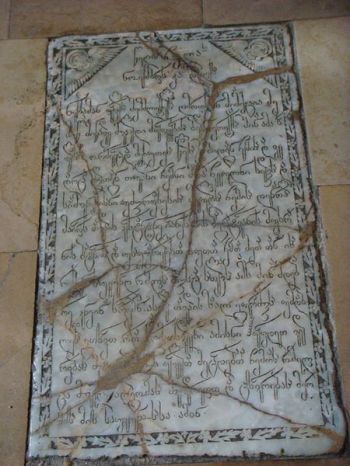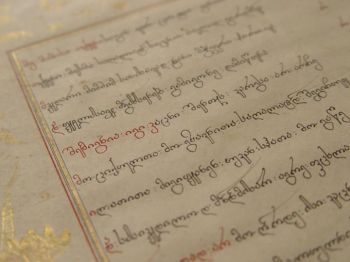 Georgian: Georgian-English, English-Georgian Dictionary and Phrasebook, Nicholas Awde and Thea Khitarishvili (Hippocrene Books 2011)
Georgian: Georgian-English, English-Georgian Dictionary and Phrasebook, Nicholas Awde and Thea Khitarishvili (Hippocrene Books 2011)
You don’t know it, but you’ve been reading Georgian all your life. Or at least: you won’t find it wholly unfamiliar if you try to learn it. Georgian words can look a lot like a number-plate or a random handful of tiles in Scrabble: zrda, zmna, zghwa, dzma, mtvrali, lghoba, mts’qemsi, grdznoba, chrdiloeti, aghdgoma, sadghegrdzelo, siskhlnak’luloba. An outsider needs courage to embark on an obstacle course of consonant-clusters when he wants to say (respectively) “grow”, “verb”, “sea”, “brother”, “drunk”, “thaw”, “shepherd”, “feeling”, “north”, “Easter”, “drinking-toast”, “anaemia”.
What accompanies the clusters is daunting too. The brief section on grammar mentions two “record-breaking mouthfuls”: gvprtskvnis and gvbrdghvnis (pg. 18). They mean, respectively, “he is peeling us” and “he is plucking us”. One word in Georgian can do the work of several words in English. Georgian uses prefixes and suffixes like English. But it uses infixes too. It is not an easy language to learn. But that’s part of its appeal.
Another part of its appeal is the beauty and uniqueness of its alphabet. A page of Georgian is like a work of art. A sentence can look like an incantation. If Georgian didn’t exist, I would like to be able to invent it and read authors like Clark Ashton Smith and Théophile Gautier in it. Fortunately, it does exist. But I can’t read it yet and will never be able to read it fluently until serious brain-modification arrives and languages become as easy to don as clothing.
Will Georgian become fashionable in those days? Or will human beings become wireheads and care only about pouring electricity into the pleasure-centres of their brains? We’ll have to wait and see. Pleasure is certainly important in Georgia. The language is famous for its complexity and the people are famous for their drinking. Ghwino, “wine”, is an ancient word and an ancient passion. Food is very important there too and this book describes how “each region of Georgia has its unique cuisine with its own special flavor” (pg. 183).
The Caucasus is a small but very diverse region. It’s a tough and clannish region too: Chechnya is near Georgia. This helps explain how it has preserved its linguistic and cultural uniqueness in the shadow of giants like Russia, Turkey and Iran. Georgian has borrowed vocabulary from all its linguistic neighbours – often signalled by a glottallized plosive, as in t’elesk’op’i, “telescope” – but it retains its unique identity. And the influence has gone the other way: you can’t think of Georgia without thinking of Josef Stalin: “Born and raised in Gori, a market town northwest of Tbilisi, his real name was Ioseb Jughashvili – and he learnt Russian only as an adult” (Introduction, pg. 7).
I’m not sure about that and I know for sure that another claim in the introduction is wrong. Or misleading, at least: “Russia … invaded and occupied South Ossetia in 2008” (pg. 8). In fact, Georgia invaded Russia and Russia counter-attacked. That might sound wrong – midget attacking giant? – but Georgians are not shrinking violets and their then president thought he would have the backing of the United States. Fortunately, he didn’t get it. Even after Stalin’s passing, the Caucasus continues to produce more history than it can consume locally.
And Stalin is a reminder that it isn’t just pleasure that’s important in Georgia. So is pain. Take the Georgian word ts’ameba. It means both “torment” and “martyrdom”. Languages reflect cultures and one of the interesting aspects of this book is the way that, by saying less, it invites more. It’s not meant to be a extensive dictionary or a comprehensive guide to Georgian, so you have to notice patterns and work some things out for yourself. Kartveli means “Georgian person” and Sakartveli means “Georgia”. Mepe means “king” and samepo means “royal”. Sakhli means “house” and sasakhle means “palace”. Tsotskhali means “alive” and sitsotskhle means “life”. Twali means “eye” and satwale means “glasses”. And so on.
And no book on a foreign language can learn the vocabulary for you. The mnemonic technique described by Anthony Burgess in Language Made Plain (1964) is useful. Georgian for “cold” is tsiwi. To learn it, I imagined picking up a piece of sea-weed with a film of ice on it. “Sea-weed” almost rhymes with tsiwi and that initial ts– sounds like ice cracking delicately. One Georgian word for “rabbit” is k’urdgheli. I imagined a Kurd holding a rabbit with one hand. “Kurd” is a foreign word in Georgian, which is a reminder that the initial consonant is glottallized, and the Georgian for “hand” is kheli, which is almost like –gheli.
Kheli is easy to remember, but you could reinforce it by thinking of the English word “cheirography”, meaning “palm-reading”, from the Greek kheir, “hand”. Is that related to the Georgian word? It might be. The Georgian neprit’i, meaning “jade”, is certainly from Greek. It comes from nephritis, “jade”, from nephros, “kidney”, because jade was thought to protect against kidney diseases. So that rare word is easy to remember. But mnemonics for a Georgian word are sometimes hard to think of. Try rts’qili, “flea”, or tovlch’qap’i, “sleet”, or varsk’vlavi, “star”.
I don’t have a mnemonic for mgeli, “wolf”, and didn’t need one. It’s phonetically simple by Georgian standards, but it’s still unmistakably Georgian. The word looks and sounds primal and has a primal meaning. Tkha, “goat”, and zgharbi, “hedgehog”, are good too. Names for animals don’t appear just in the dictionary but also in one of the specialized sections that close the book: words for weather, food and drink, winter sports, parts of the body and so on. Words like mk’lavi, “arm”, ghwidzli, “liver”, and ts’weri, “beard”, are satisfyingly Georgian, but mnemonically challenging. Twali, “eye”, is simpler, but that’s a little disappointing. Mnemonically, you can think of the villainous one-eyed King Twala in King Solomon’s Mines (1885).
That book contains another strange and phonetically challenging language: Zulu. But I don’t think it would be a good book to read in Georgian. It’s too straightforward and vigorous. Runes would be better for Rider Haggard. And for Robert E. Howard. I don’t think Lovecraft is a writer for Georgian either. The Armenian alphabet would better match his prose. It’s strange but not beautiful. As I suggested above, the writers ripest for Georgian are Gautier and Clark Ashton Smith. And if they’d learnt the language, they would have been worthy translators of its most famous literary work: Shota Rustaveli’s “national epic poem” The Knight in the Panther’s Skin (c. 1180-1205).
I hope I’m able to read a little of that in the original one day. This book is a good first step on the journey: an inexpensive but well-produced introduction to one of the world’s strangest, most complex and most beautiful languages. You could call Georgian an angelozebis ena, a “language of the angels” (if that’s right). If you did, you’d be reminded that Georgian words can sometimes be very simple: ena literally means “tongue”. It doesn’t challenge the outsider’s tongue. If you want words that do, look no further than this book. Look no lovelier too: Georgian may sometimes martyr the tongue, but it always blesses the eye.

